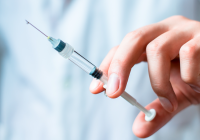Injectable HIV therapy would have to cost less than $131 a year to be cost-effective in Africa
A cost-effectiveness analysis has found that injectable, long-lasting antiretroviral therapy (ART) would need to cost no more than $ 131 a year in order to be cost-effective if used for patients who are not fully virally suppressed in lower-income settings in regions like sub-Saharan Africa. The analysis found that injectable cabotegravir/rilpivirine would only reach the… Read More »



